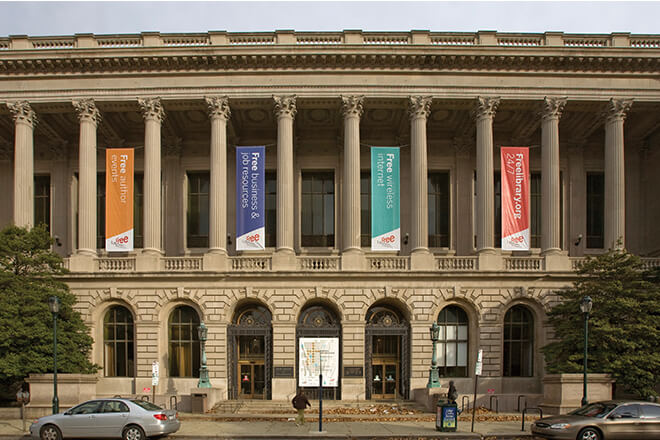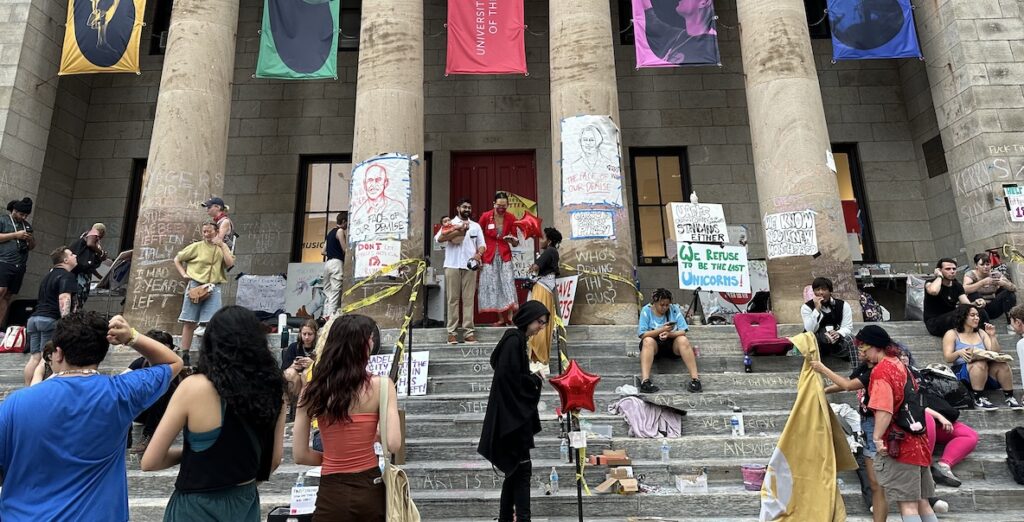Let’s be real: It was a national embarrassment. I got a tongue-in-cheek text from my cousin in Westchester, New York: “So … you got a university there that basically admitted a class on a Monday and closed down on a Friday? Seriously?”
My cousin’s not even in education. He’s a cardiologist, for crying out loud. But he’s a smart dude and he knows when something’s FUBAR. He knows that things like the abrupt closing of UArts don’t just happen. They’re fueled by some mix of malfeasance, incompetence, and a stunning lack of menschkeit, or personal character: A silent, “who, me?” board, a president resigning and slinking off without a word. It’s like when the Baltimore Colts fled their hometown for Indianapolis in the dead of night — leaving behind feelings of betrayal and embarrassment. “I’m trying to retain what little dignity I have left in this matter,” then-Baltimore Mayor William Donald Schaefer said. “If the Colts had to sneak out of town at night, it degrades a great tradition of the city.”
Imagine if a city had multiple Colts-like fiascos. Well, feels kinda like that’s what we’re going through right now in the nonprofit sector. UArts may have just been the most egregious example. Our nonprofit industrial complex seems to be imploding. While each example in the litany of headlines of late is unique, taken together, the drumbeat of bad news raises serious questions about nonprofit governance, and ought to shine a light on government’s increasing reliance on outsourcing vital services to unaccountable entities.

In addition to the UArts fiasco, there was that weird torpedoing of the stellar Free Library Author Series, in which protesting staff seemed to resign en masse and sent out an unauthorized press release announcing that the whole project had been discontinued, requiring a counter-announcement and prompting questions about just who was in charge. And then there was the financial crisis and layoffs at Resources for Human Development, a large health and human services provider, followed by the revelation that a Reading-based nonprofit was, like a private equity vulture, seeking to come in and peck away at its assets. (Really? There are nonprofits that essentially raid nonprofits?)
Remember, all of this followed Inquirer stories and a Controller report detailing how $20 million in Community Expansion Grants made to 31 community nonprofits to combat gun violence had essentially been botched. That’s $20 million to deliver $13 million in grants; the $9 million difference represented “administrative costs.” What are the chances that other grants outsourced for gun violence intervention — the numbers are in the hundreds of millions — saw better oversight and were more efficient?

We could go on and touch on the closure of the Greater Philadelphia Coalition Against Hunger, the bankruptcy of EducationWorks, or the challenges faced by PAFA. But one of the most tragic recent falls from grace is the stunning closure of Benefits Data Trust (BDT), the much-ballyhooed nonprofit that helps citizens in need obtain public benefits. BDT has long been seen as one of the city’s gems; its CEO, Trooper Sanders, who was fired a few weeks ago, was widely praised — by, among many others, me. BDT received $20 million in no-strings-attached funding from MacKenzie Scott two years ago; it had $12 million in unrestricted reserves at the end of last year and projected $32 million in 2024 revenue when its Board inexplicably announced it would close. Heartbreakingly, many of its 300-some call center operators — one-time public assistance recipients themselves — will now have to return to the benefit rolls.
So let’s see if we can connect the dots, raise some questions and draw some cursory conclusions about the suddenly turbulent state of our nonprofit industrial complex:
It’s the Governance, Stupid.
“I advise a lot of people about the duties of a nonprofit board member and the importance of serving on a governing board, yet too often people take the financial and leadership aspect of this volunteer role for granted,” Nicole Tell, executive director of BLBB Charitable, posted to LinkedIn in the aftermath of BDT’s collapse, speaking for many about the recent litany of nonprofit failures. “Where were the board and financial leaders? What were they told and provided? None of these indicate fraud or theft, so how can board members be better stewards of private and public dollars going forward?”

In all these cases — from UArts to BDT — the critical question is, to channel Watergate-era Howard Baker: What did the boards know, and when did they know it? One major foundation head tells me that every nonprofit board should have multiple members with significant financial literacy skills — the ability to dissect a P&L and cash flow statement and interrogate managers based on what their trained eyes uncover. (Maybe this should be a requirement of nonprofits, as the Sarbanes-Oxley Act demanded of public corporations beginning in 2002 in the wake of the Enron scandal.)
A dearth of such oversight skills in the nonprofit sector is not a new challenge. Eight years ago, our founding chairman, the late, legendary Jeremy Nowak, called the failure of board oversight a surefire way to attain civic mediocrity in the aftermath of other headlines chronicling similar shenanigans.
The question is whether key decisions related to financial and reputational risk are discussed and approved by those charged with exercising independent judgment,” he wrote. “Do conflicts of interest get properly disclosed and managed? Do board members have adequate information to make informed judgments? Quality organizations maintain a balance of power between management and governance, and they evolve through that tension. Governance is art as much as science, experience as well as law: Experienced directors and managers have a feel for the tension between oversight and operations and they make adjustments based on context. When the complexity of operations exceeds the capacity for a board to exercise judgment, problems fester.
I experienced the importance of such oversight under Nowak’s sometimes in-your-face board stewardship. Early on, I recall one meeting in which I was seeking approval from The Citizen board of three items. I don’t remember the first two, but the third was, in retrospect, a cockamamie scheme to raise quick money and artificially grow audience. The Board voted in favor of my first two proposals, but Nowak’s cross-examination on the third was withering. In sales mode, I persisted. Finally, Bob Keith — the entity’s voice of calm tempering Nowak’s verbal artillery — leaned forward. “Larry, you got two out of three,” he said. “Take the win.”
In economics, a “bubble” occurs when asset prices surge to levels way above the asset’s actual value. At some point, bubbles burst. Do we have ourselves a nonprofit bubble?
Take the win. That’s governance. A BDT insider tells me that Sanders was overwhelmed and may have choked after getting the MacKenzie Scott windfall. (Sanders declined to comment.) Another says it was more complicated than that; Sanders may have seemed distracted pursuing cutting-edge AI applications, but that may have been at the behest of national funders who were less enamored of underwriting huge call centers. Either way, the plan had been not to dip into the Scott money for general operations, but ultimately more than a third of it had gone by the wayside by the time BDT pulled the plug. A group of current and former BDT staffers have posted a devastating open letter that raises serious questions about Sanders and his board. Add the fact that BDT’s board chair was its founder — Warren Kantor — and you just might have had a perfect storm. Had there been anyone playing Detective Columbo to BDT’s management, as Nowak and Keith had done for me? Anyone telling them to take the win?
Beware March of Dimes Syndrome.
In economics, a “bubble” occurs when asset prices surge to levels way above the asset’s actual value. At some point, bubbles burst. Do we have ourselves a nonprofit bubble? Not quite, perhaps, because each death spiral of late has its own unique circumstances. But it does beg the question: Does Philly have too many nonprofits? That’s what one prominent civic leader suggested. “It may be time to start some real consolidation,” he texted after the BDT announcement.
We may have hit a tipping point, but this is not a new thing, either. Nonprofits, after all, are loath to declare mission accomplished. There’s actually a name for the phenomenon: March of Dimes Syndrome, named after the nonprofit founded a hundred years ago to combat polio. “The March helped fund the vaccines that eventually ended the polio epidemics — but not the organization, which, after polio’s eradication, changed its mission to preventing birth defects,” wrote John Tierney recently in City Journal. “Its leaders kept their group going by finding a new cause.”
In other words, Nonprofits can almost become too big to fail, too. Here, we’re still a too-siloed town. With the aforementioned weaknesses in board governance (not to mention the fact that often the same cast of characters populate multiple boards), what are the chances there aren’t duplication of services in key areas of our shared civic life?
The perils of governmental outsourcing
To be clear, I’m a fan of nonprofits, which is why I started one: It’s been the most mission-driven and pure of heart journey of my professional life. The city would be in far worse shape without its nonprofits serving needs that government and the private sector, respectively, haven’t met. That said, let’s go back for a little context as to how we got here.
The whole notion of philanthropy really got underway after the Gilded Age. When the federal income tax was established in the early 20th century, it exempted charitable contributions, birthing a feel-good tax shelter for plutocrats. Suddenly, the Andrew Carnegies and John D. Rockefellers of the world had a tax-free place to park their money — and do some good at the same time.
In the mid-20th century, there were less than 100,000 nonprofits. Today, there are 1.5 million. The original idea was that philanthropy could temporarily plug holes that government wasn’t filling. But now, local government invests millions in nonprofits in spaces ranging from child services to education to health care. Some 40 percent of all San Francisco spending, for example, is spent on such private contracting. Here, a 2019 Pew report found that the city spent about as much on outside contracts, including nonprofits, as on salaries and benefits. There’s nothing wrong with that — provided that tabs are kept on the return of taxpayer investment. Therein lies the rub.
In the mid-20th century, there were less than 100,000 nonprofits. Today, there are 1.5 million. The original idea was that philanthropy could temporarily plug holes that government wasn’t filling. But now, local government invests millions in nonprofits in spaces ranging from child services to education to health care.
After all, Council just passed Mayor Parker’s $6.4 billion budget. That’s a whopping 68 percent increase over Mayor Nutter’s $3.8 billion budget eight years ago. Trying to determine the value derived from that investment is dependent upon the transparency and good governance of the many nonprofits with which the city does business. In a piece for American Affairs Journal entitled “The Nonprofit Industrial Complex and the Corruption of the American City,” journalist Jonathan Ireland lays out the problem in stark detail. “As a consequence of the benefit of the doubt provided to nonprofits, there is rarely enough oversight to guarantee that they are doing what we pay them to do,” he writes. “In some cities, upwards of a billion dollars of public funds are paid to nonprofit organizations every year with glaringly insufficient safeguards to ensure that the money is used in a manner likely to serve the public interest. This money is then spent in ways that would shock the taxpayers whose hard-earned dollars are being effectively stolen from them.”
Ireland’s rhetoric can be overwrought, but he provides myriad examples. There’s the providers of homelessness services actively lobbying to make homelessness worse in order to increase their own funding, and the lobbying arm of affordable housing nonprofits fighting to keep a public housing developer from providing affordable housing because … that’s their turf.
I’ve been on the reformer versus progressive kick for quite some time. Both want social change. But only reformers realize that you don’t get systemic transformation when you eschew accountability. Is anyone in city government recording what return the taxpayer gets for the ballooning increase in contracting with nonprofits?
Well, someone recently tried. And the nonprofit sector went bonkers.
Here’s the background: Reports by the Inspector General and City Controller revealed that the city’s Office of Homelessness Services had overspent its budget by $15 million over the last four years. And one of the reasons why was the “nonprofit exemption” select municipal departments enjoy (or take advantage of) in contracting, which enables them to bypass standard competitive bidding processes.

So City Council Majority Leader Katherine Gilmore Richardson — a reformer — set out to do something about this. She put forth a bill that would effectively make nonprofits go through the same (convoluted) contracting processes as any other entity doing business with the City. And then the lobbying started. The argument was that few nonprofits have the staff or resources to navigate the city’s Byzantine procurement process.
“I know change is hard, but change is necessary,” the Inquirer reported Gilmore Richardson emailed her Council colleagues, who were feeling the heat from the nonprofit industrial complex. “If we want to create equitable rules for accountability and improve the way we do business, we must ensure there is an equal playing field for all.”
In the end, over the objection of the Parker administration, Gilmore Richardson’s bill passed and the exemption will be eliminated in a year. But to get the bill over the finish line, Gilmore Richardson introduced a Council resolution creating a task force to study nonprofit contracting procedures, with recommendations due by year’s end. That could be a good thing — the reformist answer ought to be, sure, let’s eliminate the exemption, but let’s also make sure nonprofits get paid faster, as New York City has done — or that could be reform, Philly-style: A bill passes, but only alongside a resolution that has the potential to quietly undermine it at a later date.
But at least a local lawmaker was talking about accountability, right? With nonprofits imploding and governmental spending exploding, it’s a relief anytime anyone uses the “A-word.”
Corrections: A previous version of this post misspelled the first name of MacKenzie Scott. Scott’s donation to BDT was $20 million.
![]() MORE NONPROFIT ORGANIZATION COVERAGE
MORE NONPROFIT ORGANIZATION COVERAGE




